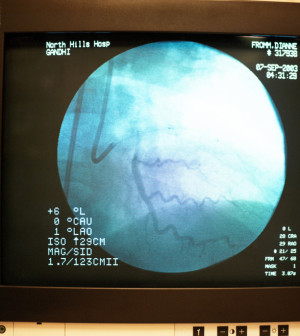- Could Your Grocery Store Meat Be Causing Recurring UTIs?
- Are You Making This Expensive Thermostat Error This Winter?
- Recognizing the Signs of Hypothyroidism
- 10 Strategies to Overcome Insomnia
- Could Artificial Sweeteners Be Aging the Brain Faster?
- Techniques for Soothing Your Nervous System
- Does the Water in Your House Smell Funny? Here’s Why
- Can a Daily Dose of Apple Cider Vinegar Actually Aid Weight Loss?
- 6 Health Beverages That Can Actually Spike Your Blood Sugar
- Treatment Options for Social Anxiety Disorder
Hospitalizations After Severe Blood Infections May Be Preventable


When people survive life-threatening blood infections, it’s common for them to land back in the hospital within a few months. But a new study suggests that could often be avoided.
The research, published in the March 10 issue of the Journal of the American Medical Association, focused on older Americans who were hospitalized for a severe blood infection, also known as sepsis.
Sepsis arises from a powerful immune reaction to an infection, such as pneumonia or urinary tract infection: Chemicals released to fight the bacteria or virus begin to trigger inflammatory responses throughout the body — potentially causing blood clots, leaky blood vessels and multiple organ failure.
Severe sepsis is often fatal, but even when people survive, they commonly land back in the hospital within 90 days, said study author Dr. Hallie Prescott, a researcher at the University of Michigan, in Ann Arbor.
The goal of the study, she said, was to uncover the specific reasons for those readmissions, and see whether some are potentially avoidable.
People who develop sepsis are often elderly and have serious medical conditions — so to some extent, hospital readmissions are inevitable, Prescott noted.
“These are very ill people,” she said. “And the question has been, can anything really be done to prevent these readmissions?”
Based on the current findings, the answer is “maybe.”
The researchers found that of over 2,800 elderly Americans who survived severe sepsis, 43 percent were back in the hospital within three months. But anywhere from 22 percent to 42 percent of those readmissions were potentially preventable, Prescott said.
That’s because the underlying reasons included problems such as pneumonia, dehydration, urinary tract infection and worsening of existing heart or lung disease. And, the authors said, those causes are avoidable — at least in theory.
But, Dr. David Gaieski, an emergency physician at Thomas Jefferson University Hospital in Philadelphia, said, “It’s difficult to say whether they’re definitely preventable.”
Still, the findings are a “good starting point” for uncovering ways to avoid some readmissions, according to Gaieski, who studies sepsis patients’ outcomes and was not involved in the study.
Worsening of heart failure or lung disease might be avoidable in some cases, for instance.
“If a 79-year-old spends a week in the hospital, they’re going to leave deconditioned,” Gaieski said, referring to the loss of muscle and endurance that comes with being ill and bed-ridden.
So one possibility, he noted, is that some patients could benefit from physical rehab after their hospital discharge. They may also need their medication doses adjusted, rather than going back on their normal regimen, Gaieski said.
It’s estimated that about 1 million Americans suffer severe sepsis each year, according to the U.S. National Institutes of Health. At least 20 percent of those people die in the hospital.
For people who survive their hospital stay, the new findings highlight an important point, Prescott said: “It’s not just an acute infection, and then it’s over.”
Patients and families should be aware that longer-term effects are common, Prescott said. Besides any lingering consequences from organ damage — such as kidney failure — those after-effects include severe fatigue, repeat infections and difficulty with thinking and memory, she noted.
According to Gaieski, older adults who survive a hospital stay for sepsis generally fall into three categories: those who can go home; those who need to stay in a rehab facility for a while; and those who need to enter a nursing home.
For patients who are able to go home, Gaieski said, families can help by making sure they take any needed medications. And if that includes an antibiotic, make sure they finish the full course, to help ensure the infection is knocked out.
“I often see patients who stop taking their antibiotics because they’re feeling good,” Gaieski said.
In general, both he and Prescott said, families should keep an eye on their loved one recovering from sepsis, and bring any concerns to their doctor.
That is not limited to sepsis recovery, however, Gaieski pointed out. In this study, older adults hospitalized for other reasons — from heart disease to pneumonia to hip fracture — also had high rates of readmission within 90 days.
Prescott made a similar point. Those few months after a hospital discharge are a “critical period” for older adults with chronic ills, she said — and families should not hesitate to ask questions about what to expect during recovery.
More information
The U.S. Centers for Disease Control and Prevention has more on sepsis.
Source: HealthDay
Copyright © 2026 HealthDay. All rights reserved.










